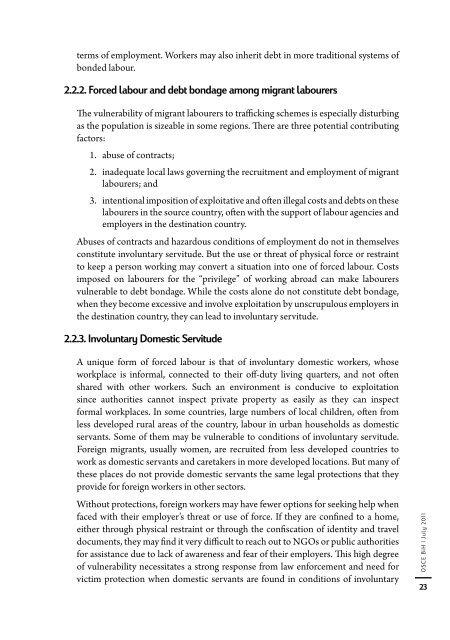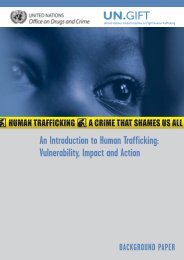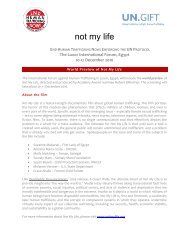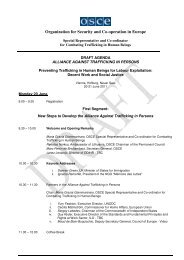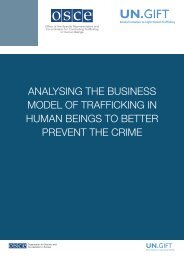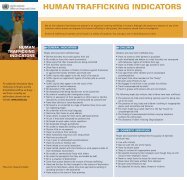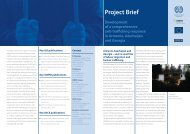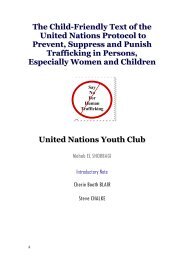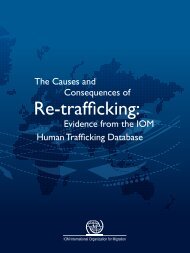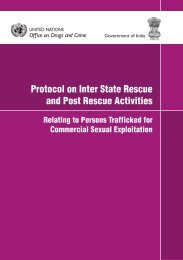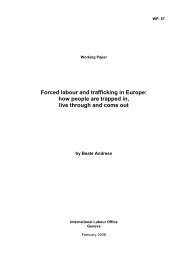Trafficking in human beings for the purpose of labour exploitation - A ...
Trafficking in human beings for the purpose of labour exploitation - A ...
Trafficking in human beings for the purpose of labour exploitation - A ...
Create successful ePaper yourself
Turn your PDF publications into a flip-book with our unique Google optimized e-Paper software.
terms <strong>of</strong> employment. Workers may also <strong>in</strong>herit debt <strong>in</strong> more traditional systems <strong>of</strong><br />
bonded <strong>labour</strong>.<br />
2.2.2. Forced <strong>labour</strong> and debt bondage among migrant <strong>labour</strong>ers<br />
The vulnerability <strong>of</strong> migrant <strong>labour</strong>ers to traffick<strong>in</strong>g schemes is especially disturb<strong>in</strong>g<br />
as <strong>the</strong> population is sizeable <strong>in</strong> some regions. There are three potential contribut<strong>in</strong>g<br />
factors:<br />
1. abuse <strong>of</strong> contracts;<br />
2. <strong>in</strong>adequate local laws govern<strong>in</strong>g <strong>the</strong> recruitment and employment <strong>of</strong> migrant<br />
<strong>labour</strong>ers; and<br />
3. <strong>in</strong>tentional imposition <strong>of</strong> exploitative and <strong>of</strong>ten illegal costs and debts on <strong>the</strong>se<br />
<strong>labour</strong>ers <strong>in</strong> <strong>the</strong> source country, <strong>of</strong>ten with <strong>the</strong> support <strong>of</strong> <strong>labour</strong> agencies and<br />
employers <strong>in</strong> <strong>the</strong> dest<strong>in</strong>ation country.<br />
Abuses <strong>of</strong> contracts and hazardous conditions <strong>of</strong> employment do not <strong>in</strong> <strong>the</strong>mselves<br />
constitute <strong>in</strong>voluntary servitude. But <strong>the</strong> use or threat <strong>of</strong> physical <strong>for</strong>ce or restra<strong>in</strong>t<br />
to keep a person work<strong>in</strong>g may convert a situation <strong>in</strong>to one <strong>of</strong> <strong>for</strong>ced <strong>labour</strong>. Costs<br />
imposed on <strong>labour</strong>ers <strong>for</strong> <strong>the</strong> “privilege” <strong>of</strong> work<strong>in</strong>g abroad can make <strong>labour</strong>ers<br />
vulnerable to debt bondage. While <strong>the</strong> costs alone do not constitute debt bondage,<br />
when <strong>the</strong>y become excessive and <strong>in</strong>volve <strong>exploitation</strong> by unscrupulous employers <strong>in</strong><br />
<strong>the</strong> dest<strong>in</strong>ation country, <strong>the</strong>y can lead to <strong>in</strong>voluntary servitude.<br />
2.2.3. Involuntary Domestic Servitude<br />
A unique <strong>for</strong>m <strong>of</strong> <strong>for</strong>ced <strong>labour</strong> is that <strong>of</strong> <strong>in</strong>voluntary domestic workers, whose<br />
workplace is <strong>in</strong><strong>for</strong>mal, connected to <strong>the</strong>ir <strong>of</strong>f-duty liv<strong>in</strong>g quarters, and not <strong>of</strong>ten<br />
shared with o<strong>the</strong>r workers. Such an environment is conducive to <strong>exploitation</strong><br />
s<strong>in</strong>ce authorities cannot <strong>in</strong>spect private property as easily as <strong>the</strong>y can <strong>in</strong>spect<br />
<strong>for</strong>mal workplaces. In some countries, large numbers <strong>of</strong> local children, <strong>of</strong>ten from<br />
less developed rural areas <strong>of</strong> <strong>the</strong> country, <strong>labour</strong> <strong>in</strong> urban households as domestic<br />
servants. Some <strong>of</strong> <strong>the</strong>m may be vulnerable to conditions <strong>of</strong> <strong>in</strong>voluntary servitude.<br />
Foreign migrants, usually women, are recruited from less developed countries to<br />
work as domestic servants and caretakers <strong>in</strong> more developed locations. But many <strong>of</strong><br />
<strong>the</strong>se places do not provide domestic servants <strong>the</strong> same legal protections that <strong>the</strong>y<br />
provide <strong>for</strong> <strong>for</strong>eign workers <strong>in</strong> o<strong>the</strong>r sectors.<br />
Without protections, <strong>for</strong>eign workers may have fewer options <strong>for</strong> seek<strong>in</strong>g help when<br />
faced with <strong>the</strong>ir employer’s threat or use <strong>of</strong> <strong>for</strong>ce. If <strong>the</strong>y are conf<strong>in</strong>ed to a home,<br />
ei<strong>the</strong>r through physical restra<strong>in</strong>t or through <strong>the</strong> confiscation <strong>of</strong> identity and travel<br />
documents, <strong>the</strong>y may f<strong>in</strong>d it very difficult to reach out to NGOs or public authorities<br />
<strong>for</strong> assistance due to lack <strong>of</strong> awareness and fear <strong>of</strong> <strong>the</strong>ir employers. This high degree<br />
<strong>of</strong> vulnerability necessitates a strong response from law en<strong>for</strong>cement and need <strong>for</strong><br />
victim protection when domestic servants are found <strong>in</strong> conditions <strong>of</strong> <strong>in</strong>voluntary<br />
OSCE BiH | July 2011<br />
23


